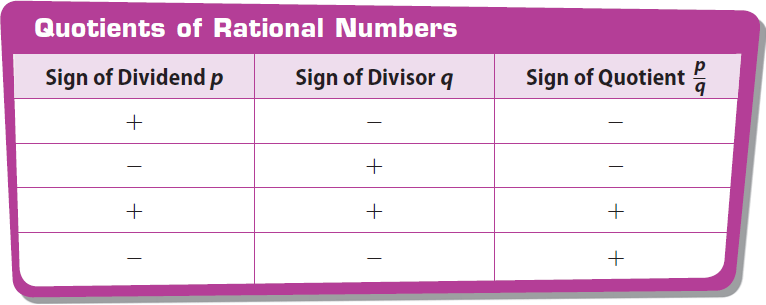QUOTIENTS OF RATIONAL NUMBERS
Subscribe to our ▶️ YouTube channel 🔴 for the latest videos, updates, and tips.
In mathematics, a rational number is any number that can be expressed in the form p/q where 'q' is not equal to zero.
The quotient of the rational number p/q is nothing but the result that we get when we divide 'p' by 'q'.
The rules for the sign of quotient are summarized below.
Let p and q be rational numbers.

Example 1 :
Divide 2/3 by -7/6 and find the quotient.
Solution :
Step 1 :
Take the reciprocal of the second rational number.
-7/6 ---- reciprocal ----> -6/7
Step 2 :
Multiply the first rational number 2/3 by -6/7
(2/3) x (-6/7)
Step 3 : Simplify
(2/1) x (-2/7)
Step 4 : Multiply
(2/1) x (-2/7) = -4/7 Positive times negative equals negative
So,
2/3 ÷ -7/6 = -4/7
Example 2 :
Divide -2 by 8/3 and find the quotient.
Solution :
Step 1 :
Take the reciprocal of the second rational number.
8/3 ---- reciprocal ----> 3/8
Step 2 :
Multiply the first rational number 2 by 3/8
(-2) x (3/8)
Step 3 : Simplify
(-1) x (3/4)
Step 4 : Multiply
(-1) x (3/4) = -3/4 Positive times negative equals negative
So,
-2 ÷ 8/3 = -3/4
Example 3 :
Divide 9/5 by 3 and find the quotient.
Solution :
Step 1 :
Take the reciprocal of the second rational number.
3 ---- reciprocal ----> 1/3
Step 2 :
Multiply the first rational number 9/5 by 1/3
(9/5) x (1/3)
Step 3 : Simplify
(3/5) x (1/1)
Step 4 : Multiply
(3/5) x (1/1) = 3/5 Positive times positive equals positive
So,
9/5 ÷ 3 = 3/5
Example 4 :
A diver needs to descend to a depth of 100 feet below sea level. She wants to do it in 5 equal descents. How far should she travel in each descent ?
Solution :
To find how far she should travel in each descent, we have to divide 100 by 5.
Step 1 :
Take the reciprocal of the divisor 5.
5 ---- reciprocal ----> 1/5
Step 2 :
Multiply 100 by 1/5
(100) x (1/5)
Step 3 : Simplify
(20) x (1/1)
Step 4 : Multiply
(20) x (1/1) = 20
So, she should travel 20 feet in each descent.
Example 5 :
Over 5 months, Carlos wrote 5 checks for a total of $323.75 to pay for his cable TV service. His cable bill is the same amount each month. What was the change in Carlos’s bank account each month to pay for cable?
Solution :
Step 1 :
Use a negative number to represent the withdrawal from his account each month
Step 2 :
Find -323.75 / 5
Step 3 :
Determine the sign of the quotient.
The quotient will be negative because the signs are different.
Step 4 :
Divide.
-323.75 / 5 = -64.75
So, Carlos withdrew $64.75 each month to pay for cable TV.
Subscribe to our ▶️ YouTube channel 🔴 for the latest videos, updates, and tips.
Kindly mail your feedback to v4formath@gmail.com
We always appreciate your feedback.
About Us | Contact Us | Privacy Policy
©All rights reserved. onlinemath4all.com

Recent Articles
-
GMAT Quantitative Reasoning Questions and Answers
Dec 27, 25 09:33 PM
GMAT Quantitative Reasoning Questions and Answers -
10 Hard SAT Math Questions (Part - 40)
Dec 25, 25 08:30 AM
10 Hard SAT Math Questions (Part - 40) -
10 Hard SAT Math Questions (Part - 41)
Dec 24, 25 07:58 PM
10 Hard SAT Math Questions (Part - 41)

